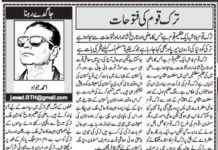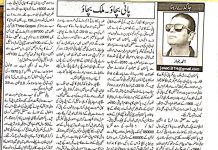“I was selling kulfis when 10 older boys approached me from behind,” shares Zulfiqar Ali Chachar, while referring to the ‘tragedy’ that has scarred him to this day. “They took my kulfis and ran away without paying me. I was so small I couldn’t even stand up to them or chase them. I was afraid that my father would get angry and started crying on the street. You see, I come from a poor farming family in a village called AmanChachar, 25km from Daharki. Our family made very little money so my father started a kulfi reri to help meet ends and this was a major loss for him.”

Mirpur Mathelo boy comes third in international competition
Zulfiqar didn’t want to sell kulfis for a living. Like most children his age, he wanted to go to school with his friends. But his family’s finances forced him to work and pay for his own studies. For primary school, he walked two kilometres to school each day but couldn’t afford to buy books. So he made a deal with his seniors to buy books from them on a significant discount. He thought he was getting a good education until he applied for admission at a school run by an NGO called The Citizens Foundation (TCF). For admission into the eighth grade, Zulfiqar was asked, “What is a cell?” He had no idea what a cell was. He realised that all he knew, after years of education, was alif, be, pe — the Urdu alphabet — and how to memorise things. This was the day his determination to get quality education was born and the day his life changed forever.
Zulfiqar couldn’t afford to go to college but thanks to a small grant from TCF, he was able to afford tuition fees for a college 35km away from his village. However, he didn’t always have money for the bus fare so he made an arrangement with his teacher to allow him to miss some classes and study harder at home. Eventually, he ran out of money and had to stop his education. His parents set up a small shop for him to run in a nearby town. Even as his shop began to do well because of his resourcefulness and hard work, Zulfiqar didn’t want to run it. Instead, he wanted to go to university like other boys his age.
It was then that a friend from TCF told him about a talent hunt programme that might enable him to attend IBA Sukkur with support from scholarships. “What’s the point in applying?” Zulfiqar told his friend. I have a shop to run and my parents depend on me. “Yaar apply tau kardo,” responded his friend, who personally filled out Zufiqar’s application forms and submitted them. Zufliqar went on to ace the IBA Sukkur test and secured his admission.
LUMS or IBA?
According to Zulfiqar, students from rural Sindh usually go through a ‘zero semester’ at IBA Sukkur before their formal programme starts so they can be brought to the same level as other students. Two weeks before the finals of the zero semester, Zulfiqar’s brother, who was managing the shop in his absence, passed away. Zulfiqar thought of giving up his studies and going back to the shop. But his friends convinced him and his father otherwise. Around eight of his friends started depositing money in Zulfiqar’s account to support him every month, telling him that they had found an anonymous sponsor for him. Fortunately, Zulfiqar won an actual scholarship at IBA Sukkur soon after, which was able to fully support him.
Zulfiqar went on to become the vice-president of the student body at IBA Sukkur and flourished in his academics as well as extra-curricular activities. He even raised money for furniture, stationery and other resources to refurbish a school for street children near the university. After graduating from IBA Sukkur, he moved to Karachi for an internship and is currently looking for a job. His father recently asked him to approach the village wadera to help him find one but Zulfiqar refused. “I’ve only asked God for help all my life,” says Zulfiqar, his face beaming with confidence which comes from being a self-made man in the making. “I am the most educated man in my village today. Once I have enough resources, I’m going to open a school in my village. Why should I ask my wadera for help? If you believe in yourself and work hard, opportunities will knock on your door.”
Dampened spirits: Making pakoras instead of electrical circuits
Extraordinary Pakistanis seeks to find and share inspirational stories about everyday Pakistani heroes (if you know someone who should be profiled, send us a tweet @Mbilallakhani). If we don’t share these stories about Pakistan, no one else will.







